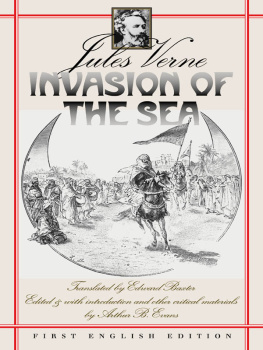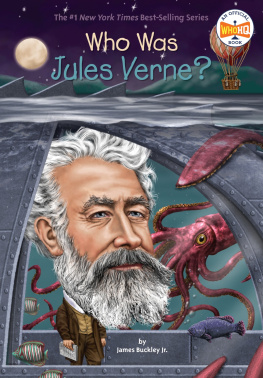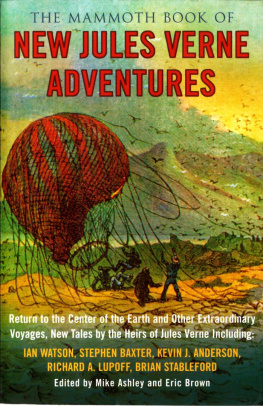Hollywood Presents
JULES VERNE
HOLLYWOOD PRESENTS
JULES VERNE
The Father of
Science Fiction
on Screen
BRIAN TAVES

Due to variations in the technical specifications of different electronic
reading devices, some elements of this ebook may not appear
as they do in the print edition. Readers are encouraged
to experiment with user settings for optimum results.
Copyright 2015 by The University Press of Kentucky
Scholarly publisher for the Commonwealth,
serving Bellarmine University, Berea College, Centre College of Kentucky,
Eastern Kentucky University, The Filson Historical Society, Georgetown
College, Kentucky Historical Society, Kentucky State University, Morehead
State University, Murray State University,
Northern Kentucky University, Transylvania University, University of
Kentucky, University of Louisville, and Western Kentucky University.
All rights reserved.
Editorial and Sales Offices: The University Press of Kentucky
663 South Limestone Street, Lexington, Kentucky 40508-4008
www.kentuckypress.com
Cataloging-in-Publication data is available from the Library of Congress.
ISBN 978-0-8131-6112-9 (hardcover : alk. paper)
ISBN 978-0-8131-6114-3 (pdf)
ISBN 978-0-8131-6113-6 (epub)
This book is printed on acid-free paper meeting
the requirements of the American National Standard
for Permanence in Paper for Printed Library Materials.

Manufactured in the United States of America.

| Member of the Association of
American University Presses |
For the memory of Larry Grabercousin, mentor, inspiration
Contents
Introduction
How a French Author Met Hollywood
From the outset of his career as a novelist in the 1860s, Jules Verne was an author who broke the rules. He not only defined a new genre, science fiction, but also appealed to a wide audiencereaders of all ages around the world. Now, going on 150 years later, his novels continue to sell in all languages as well as in condensations for children and comic books.
In the 1870s, Vernes stories became stage blockbusters, and they remain staples of the theater. By the beginning of the twentieth century, his tales emerged as mainstays of the screen. From trick films to the introduction of special effects, color, widescreen, and three-dimensional filming, and in television specials, series, and miniseries, whether live action or animation, Verne has conquered every screen form. In these pages, I discuss all of these forms, and the reader will learn how Verne films have also resonated in theme parks and video games.
Just as Vernes writing broke the rules, so too do the screen adaptations. There is no one-to-one correspondence between a novel and a film; Vernes stories have given rise to multiple versions, adjusted for various mediums, produced for all audiences. To understand Verne films involves not only discussing famous titles, spectacles that have triumphed over the movie screen and echo on television and video release, but also analyzing others that, although less recognized, are no less deserving of attention.
Few writers have enjoyed such enduring screen success as Verne in so many forms. In these pages, there has been no need to reach for or suggest abstract influences or tenuous links between these films and the author: they all are squarely rooted in his writing. Such films nearly always advertise their source; the phrase based on Verne presells a film and is a form of box office insurance no less than a big-name star. At the same time, Verne films reveal a historical development, an intertextuality, as they interact with the influences of previous versions, screen technologies, and publishers treatments of the author. Verne films continue to evolve today in ever more complex recognition of the fact that when we are speaking of Verne, the text of his writing essentially now includes an awareness of his screen adaptations.
If you pronounce Jules Vernes name with the proper French lilt, outside of some academic circles youll receive only bewildered stares. When his works were presented in 1970 to my sixth-grade class through Scholastic Book Services, school chums called him Julius Verne; Isaac Asimov recounted how he thought the name was Jewels Voine. Whatever the pronunciation of Jules Vernes name, he has long been the bestloved French author among English speakers, who have adopted him as one of their ownand screen adaptations have played a major role in public understanding of his work.
Even for those few who have not read Jules Verne (18281905), the authors very name conjures a submarine traveling twenty thousand leagues under the sea, a tour against the clock around the world in eighty days, a trip from the earth to the moon, and a journey to the center of the earth. Vernes name is synonymous with scientific progress and the challenges, glories, and disasters it has brought. More than simply an author, Verne is a phenomenon of the scientific age; in him we see both a reflection of our advances and the perils they have engendered.
Despite Vernes adoption of a nineteenth-century romantic sensibility, his enthusiasm for the idea of progress was tempered from the time of his earliest stories, whether by the insanity of the Arctic explorer in Journeys and Adventures of Captain Hatteras (1866) or by Captain Nemos use of the Nautilus as a warship in Twenty Thousand Leagues under the Seas (1870). Vernes publisher rejected his 1863 novel Paris in the 20th Century as too downbeat, and it was not published until some 130 years later to recognition as a pioneering dystopia. Verne introduced He was one of the first authors to study the relationship between humanity and nature, noting his heroes practical dependence on the environment in a global perspective. Vernes works are shaped by conditions around the world, and Vernian characters motivations are less personal than the result of political, colonial, and economic forces, such as Nemos battle against British imperialism or the struggle for Hungarian nationalism in Mathias Sandorf (1885).
The nineteenth- and early-twentieth-century conceptions of Verne as a prophet of the future have been increasingly supplanted by recognition of his status as a literary figure. On the European continent, Verne has been revived and esteemed since the 1950s, studied from a variety of ideological and methodological viewpoints, and utilized by many of the most prominent figures in contemporary theory and criticism. Structuralists and post-structuralists as well as critics from the Marxist to the psychoanalytic schools have found the Verne canon especially amenable to their endeavors.
Growing up in the seaport hub of Nantes familiarized the young Jules with the lure of distant horizons. A contradictory influence emanated from Vernes father, a lawyer who enforced a strict, by-the-clock life on his family, tendencies that Verne would later mock in his characterization of the human machine, Phileas Fogg, in Around the World in Eighty Days (1873). Resolving the conflicting influences of rationality and imagination resulted in a duality that would form the foundation of Vernes fiction; he found his creative mtier by combining scientific background and adventurous incident through science fiction.
Next page










